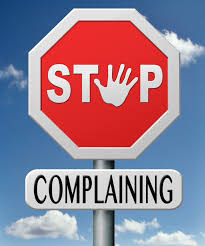What’s Really Happening When You Vent All the Time

By Martha Beck
“Yes, your situation is infuriating. And yes, complaining bitterly can make you feel better
but only up to a point”. ~ Martha Beck
Oh, the joy of collective bitching! How sweet it is to speak the unspeakable truth about the stupidity of your boss, the tedium of your daily chores, the intolerable passive aggression of your in-laws!
Until you start to feel a tad sick—much like you might after, say, polishing off a package of cookies.
Maybe you’ve had the creeping feeling that frequent venting, like smacking your foot with a hammer, may not be an optimal health choice in the long term. Sure, it’s cathartic, but can it also hurt you? Is it equally useful in all contexts? Does it help us solve problems, or merely entrench them more deeply in our minds and, therefore, our lives?
The very word vent hints at the answers. We also call it blowing off steam because we know venting is the metaphorical equivalent of controlling the pressure in a steam engine. Negative emotions give us energy to act—there’s nothing like intolerability to light a fire under one’s feet—but too much of that negative energy, contained too tightly, causes explosions in people and machines alike. (For example, if parents couldn’t vent their feelings about colicky infants, exhausting toddlers, or obnoxious teenagers, no human child would ever survive long enough to see adulthood.)
So venting is useful and necessary. It’s also easy to misuse. Many of us, fearing we’ll explode, err on the side of venting excessively; releasing so much pressure we can’t move forward as powerfully as we otherwise could. Vent too much of your frustration, and you may never invent a brilliant solution to a practical problem or challenge social injustice. Vent all your passion, and you may never write the book that’s inside you or pursue the love of your life.
Fortunately, it’s fairly easy to tell whether you’re venting too much, too little, or just enough. Most often we know we’re not venting enough when we’re keeping secrets—for example, swallowing anger at a loved one, hiding misbehavior (your own or someone else’s), or feeling too ashamed to talk about failure or disappointment. Refusing to share such intense emotional issues leads to shallow interactions that leave us feeling unseen or misunderstood.
If you feel isolated because you’re hiding something you consider unpleasant or embarrassing, you must vent. Talk to the person or people you trust most. If it doesn’t feel right or safe to vent with loved ones, find a therapist, a support group, or a hotline. You’ll be amazed by how much better you’ll feel once you have a safe place to let out your internal pressure and pain.
On the flip side, you’ll know you’re venting too much when you complain about a situation constantly without ever actually changing your behavior. You tell everyone from your coworkers to your dentist how much you despise your neighbor, but go on attending her dinner parties with a smile on your face and murder in your heart. You plod along at your thankless job all day every day, then moan about it all evening, every evening. You participate graciously in family gatherings even as you mentally note your relatives’ outrageous dysfunction, the better to vent afterward with your friends. Just like you did last week.
This amount of venting leaves you stranded in the very places you most dislike, and over time it creates a sense of powerlessness that fuels even more venting. You can see where this is headed. It’s in this situation that venting can become truly toxic, even dangerous, like an exhaust pipe pumping fumes back into a car.
We all know people who endlessly bemoan their own helplessness. That sort of venting feels so noxious that almost everyone backs away from it. If you vent like a victim of circumstance—even if you happen to truly be a victim of circumstance—it’s imperative that you stop now and instead act on the very information you’ve been sharing (and sharing, and sharing) with others.
The fix for excessive venting is something I call confronting the duck. In the movie Julie & Julia, a young amateur chef sets out to make every recipe in Julia Child’s classic Mastering the Art of French Cooking. One of the most daunting recipes requires boning a duck, and the heroine puts it off until, finally, she draws courage from Julia’s words: “You may think that boning a duck is an impossible feat…. Don’t be afraid. Take your knife; confront the duck.”
Your “duck” is any situation that makes you vent, and vent, and vent. Confronting the duck means using all that energy to push yourself through your fear and start acting for positive change. If you’ve been venting about something you want to do, it’s time to actually do it. If you’ve been venting about an unfair system, I want you to stand up for justice. If someone’s driving you crazy, you need to grab the wheel and drive yourself back to sanity.
Of course, most people don’t know how to confront a duck effectively. If they stop venting, they may go straight to an angry, fear-based explosion rather than to skillful action. Yet, done well, confrontation is calm, civilized, often gentle—though never weak or martyred. Here’s my favorite method, one I’ve used to confront more ducks than I can count.
Get some paper and start by writing “Here’s what’s really bothering me.” Then vent like a steamship having its gaskets cleaned. Pour everything onto the page—your anger, your disapproval, your venom and spite. Include details about your adversary’s intellectual failings and personal hygiene. If you don’t hold back, this pen-and-paper ventfest should let off enough steam to help you think more calmly.
Now you’re in a position to plan your duck confrontation in more detail. Get a new piece of paper. First, write down exactly what’s bothering you—not vague complaints like “You never pay attention to me!” but clear specifics like “When I’m talking, you’re always looking at your phone.” List as many specific complaints as you can.
Next, write how these troublesome things affect you. Instead of the wild insults from your initial rant, simply describe the way you feel and react in the problematic situation. For example, instead of “You’re ruining my life!” you might write “I’ve been so pre occupied by this that I spend a lot of time feeling angry and unhappy.” Don’t cast blame, just describe what’s happening.
Third, write down exactly what must change for you to feel better—the precise amount of the raise you’d need to feel fairly compensated, the way you’d like to be spoken to, and so on. Finally, write down exactly what the consequence will be if the change you want or need doesn’t occur. Again, this isn’t a punitive measure. It’s more like saying, “I need to drink liquid every day or I’ll die of dehydration.” Not a threat, not a complaint. Just a simple, factual statement.
Now it’s time to confront your duck. Arrange for a conversation with the person or group you’re hoping you will change. Make an appointment with your supervisor. Meet your sister for coffee and conversation. Rent a bullhorn and instigate a picket line if you have to. This will be scary—if it weren’t, you’d have done it long ago instead of venting so much. To get yourself through the fear, close the vents. Draw on the full power of your frustration, your outrage, your convictions.
Because you’ve clarified exactly what you want and what you’ll do if you don’t get it, you can afford to communicate peacefully, without panicky defensiveness. For example, screaming “You’re a junkie, Bob and I can’t take this anymore!” is far less powerful than quietly reading a classic intervention letter: “Bob, I can’t go on watching you take drugs. It’s affected my life because we no longer share positive experiences, and I’m afraid you’ll either die or end up in prison. Unless you go to rehab, I won’t interact with you anymore.” Yelling at a teenager about homework isn’t as effective as explaining: “When you don’t do your homework, I worry about your future. I can’t force you to do this stuff, but if you don’t, I can’t protect you from the consequences.”
This kind of confrontation doesn’t need to be violent because it carries the weight of truth. You mean business. All that energy you once vented is now contained in constructive action. You won’t always get what you want. Sometimes you’ll get the emphatic closure that comes from realizing another person or system is insane. But sometimes you’ll be heard, understood and respected by people who will take your feedback and use it. Even if nothing changes, you’ll be left with more inner peace because at the very least you will have acted instead of having merely talked about acting.
Use venting correctly, and you’ll begin to sense how powerful you really are. You’ll share enough that you can be supported. You won’t share so much that you feel poisoned. You’ll know how to capture the wisdom in a venting session and figure out real solutions to your problems. You’ll steam onward into a bolder, braver version of yourself—full speed ahead.
Article originally appeared on Oprah.com

